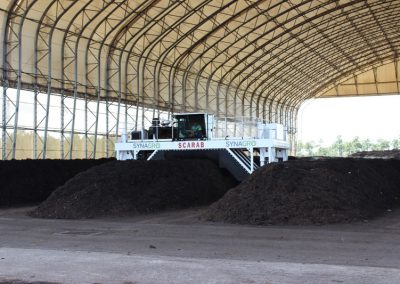Stabilization
Many water reclamation facilities find themselves without or with undersized biosolids stabilization processes. There is any number of reasons for these situations: inexpensive landfill disposal made stabilization unnecessary; on-site incineration installed decades ago may have provided sufficient disposal capacity, or perhaps influent flow rate has increased to the point where the original processes are no longer able to meet the stabilization standards.

Synagro offers its partners a broad range of stabilization techniques through both design-build-operate and maintain (DBO) or design-build-finance-operate and maintain (DBFOM) delivery methods. These systems can be developed to achieve Class B or Class A pathogen reduction and vector attraction reduction (VAR) standards. The end result is a biosolids product suitable for land application or distribution and marketing.
- Alkaline Stabilization – Synagro has designed, installed and now operates numerous processes in which we treat liquid or dewatered biosolids with alkaline agents to increase and maintain pH. In many cases we also couple these processes with mechanical dewatering like we’ve been doing for Anne Arundel County, Maryland for decades.
- Digestion – Anaerobic or aerobic digestion to reduce volatile solids while achieving Class B pathogen reduction is a common approach to establishing a biosolids beneficial use program. In Honolulu, Hawaii and Victoria, British Columbia, Canada, we have designed, built and now operate anaerobic digestion to provide energy for the biosolids dewatering and drying systems we operate. Through relationships with various vendors in the industry, we can also provide digestion that meets Class A pathogen reduction.
- Composting – Synagro is the nation’s largest composter of sludge and biosolids having designed, built, financed and now operating several facilities processing solids from numerous regional generators. We produce a stable fertilizer/soil conditioner that we distribute as compost.
- Thermal Drying – Synagro currently operates a number of facilities that dry biosolids to produce fertilizer pellets and/or fuel product pellets that meet Class A pathogen reduction and vector attraction reduction standards. Among these dryers are different types of processing technologies, providing Synagro with an unrivaled understanding of the pros and cons of each and how those technologies best fit within operating environments.
- Thermal Reduction – In cases where alternative disposal opportunities are limited or prohibitively expensive, Synagro can offer thermal reduction (incineration). In some cases, these systems can capture waste heat exhausted from the process and use it to produce electricity or to provide the thermal resource for systems designed to partially dry the solids prior to insertion into the thermal reduction process.
We’ll help you decide which stabilization technique best meets your goals and objectives and, under a public-private partnership approach, design including the work necessary to obtain and maintain regulatory approvals to perform all aspects of the project, finance, if desired, construct and then operate and maintain the facility, providing you with guaranteed biosolids management and long-term budget certainty. As integral components of our partnership, Synagro will properly and sustainably manage the end product from any of these processes. We also ensure full compliance with our permits, including record keeping and timely reporting.
